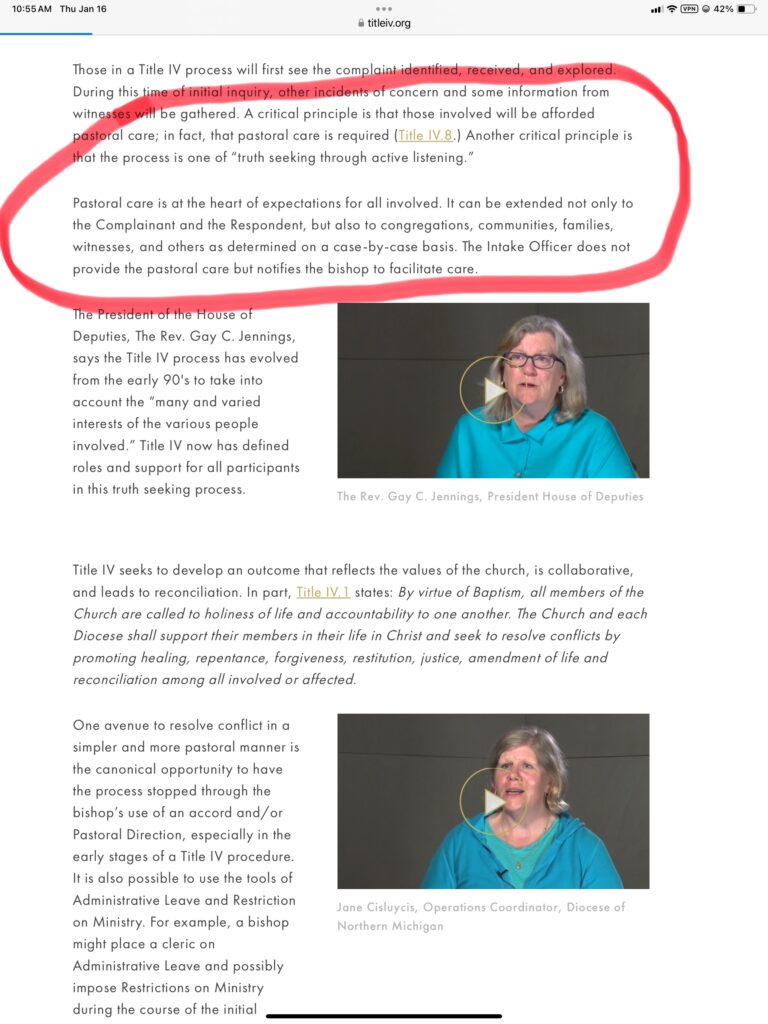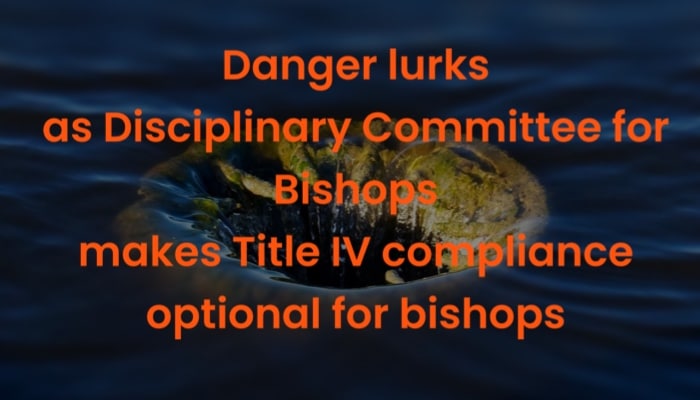A dangerous trend emerges at the Disciplinary Board for Bishops
Anglican Watch has been following a host of Title IV cases involving bishops since Sean Rowe’s election, and we are experiencing a growing sense of alarm. Specifically, the Disciplinary Board for Bishops, which includes chair Nick Knisely, PB Sean Rowe, and intake officer Barb Kempf, has recently issued several decisions in which it has, de facto, decided that following Title IV is optional, and ignoring the requirements of Title IV is within the prerogative of bishops diocesan.
These are disturbing precedents that are causing substantial harm to the denomination and the well-being of Title IV complainants, while undercutting Rowe’s proclaimed goal of building “one church.”
What specifically is happening?
Before we plunge into the specifics, there’s some context that provides an important framework to understand these cases. As of January 2025, the canonical presumption is that Title IV complaints will be resolved within 15 months. Moreover, complainants are to receive monthly updates.
Those are problems, because there are almost 20 cases still lurking somewhere between Barb Kempf’s inbox and the Unobstructed Universe and have been there for more than a year.
That brings up the age-old question: If someone is traumatized by clergy misconduct, what does it do to them when the church sits in splendid silence for a year? The answer is it adds another layer of trauma.
Cases that do reach the Reference Panel, however, increasingly face a dire outcome. Specifically, the Disciplinary Board for Bishops is treating the requirements of Title IV as optional. Thus, when the complaint is, “I contacted the bishop diocesan (or Todd Ousley) and they ignored me,” the Disciplinary Board essentially replies with, “Tusk, tusk. Sorry that happened, but the bishop is allowed to ignore Title IV. So, they’ll send you a written letter of apology, and we’ll send them to Title IV training.”
The Disciplinary Committee’s approach is BS
Before we go further, let’s call a spade a spade. This business of allowing bishops to do whatever they want when it comes to Title IV is BS, world without end. Here’s why:
- The canons are just that, canons, otherwise known as church law. So, the Disciplinary Board needs to either treat them as such or have the integrity to come right out and say that church canons are mere guidelines.
- Treating church canons as mere guidelines is unfair to both Title IV respondents and complainants. In both instances, church members cannot predict what conduct is or is not actionable. And because the denomination invariably gets clergy the benefit of the doubt, the result is what we have now: A situation in which clergy misconduct is almost never actionable.
- Church Canon 17.8 specifically says that laity accepting any role within the church do so as fiduciaries, which is the highest standard of care under the law. Does anyone in their right mind think laity will adhere to this standard when canonical requirements are merely suggestions?
- The denomination cannot hope to enforce canonical provisions like the so-called Dennis Canon (which creates an equitable interest in all church property on the part of dioceses and the national church) when the church itself refuses to enforce other parts of the canons, including Title IV. And given that the church routinely ignores retaliation by clergy, if as a warden I suspect the rector is, for example, embezzling, do you really think I’m going to report it under the circumsances? Be real.
- This approach assumes good intent on the part of bishops. Normally, we’d support this approach, as it’s a foundational component to resolving conflict. But bishops have access to the Title IV website, a Title IV listserv, Title IV training, their chancellors, their standing committees, outside legal counsel, and knowledgeable church members. Plus, they can and should read Title IV in its entirety, twice, every time a Title IV complaint comes in. So, even if they were trained by the corrupt Todd Ousley, bishops may be presumed to have actual knowledge of the provisions of Title IV. And if they don’t have actual knowledge, it’s because they don’t care to acquire that knowledge. A pastoral response is provided in all cases. How is this hard to understand?

A pastoral response is required in ALL cases. What part of this isn’t clear to bishops? This is directly from the Title IV site. - This approach flies in the face of Rowe’s stated goal of having “one church.” Indeed, if bishops can ignore the provisions of Title IV whenever they want, why bother with a national church? A hierarchy is nothing but a waste of time and resources.
- Does anyone really think, even for a moment, that a fauxpology, carefully vetted by the diocesan chancellor, that says something to the effect of “I’m sorry for any mistakes I have may have made,” does anything besides exacerbate things?
- The church is making a lot of noise about the need to become trauma-informed in these situations. But that is not the real issue here. Being trauma informed is different from having empathy/compassion. Indeed, trauma training prevents people from saying stupid things like, “He’s in a better place,” or “God won’t give you more than you can handle.” Further, if as a bishop or priest, you don’t understand why brushing off a victim is a problem, you lack the empathy and moral compass to be clergy. In other words, do us all a favor and go away.
- Title IV expressly talks about the need to care for complainants, so we don’t understand how not caring for complainants falls under the aegis of being trauma informed. Specifically, Title IV’s stated goals are to “promote healing, repentance, forgiveness, restitution, justice, amendment of life, and reconciliation.” How are any of these goals accomplished when the complainant is ignored? This isn’t rocket science, folks.
- In our experience, intentional mishandling of Title IV complaints is the biggest biggest disciplinary issue involving Episcopal bishops. Indeed, financial and sexual misconduct, while common among bishops, we estimate comprise about 5 percent of all Title IV complaints. Thus, by sandbagging most Title IV complaints, the Disciplinary Committee defangs the entire notion of Title IV as accomplishing anything.
- Many of the cases now before Disciplinary Committee involve, directly or indirectly, issues of abuse. By brushing off complaints of nonfeasance, the denomination exposes the vulnerable to potential further abuse. Yet true to form, if the Episcopal Church gets sued over these issues, it will claim, “We promptly addressed these matters in accordance with Title IV.” In doing so, the denomination uses Title IV as a smokescreen, in order to claim that it took appropriate action. But as we have seen many times, Title IV reflects organizational indifference to misconduct, not a path towards resolution.
- A Title IV process that is de facto meaningless undercuts the credibility of the Episcopal Church. Indeed, judicatories wander about bewailing system racism and other social ills, yet the church cannot even muck out its own ethical stall. So why would anyone take the church seriously on other issues?
- Treating Title IV as a set of optional guidelines leads to outcomes that disincentivize persons of integrity from remaining members of the denomination. Indeed, why would anyone support the denomination when it tacitly approves of abuse? Church should be a safe place, but in the Episcopal Church, it’s the Wild, Wild West, where sexual harassment is okay, bishops can ignore the canons at will, clergy engage in felony criminal conduct without consequence, and where rubber-stamp vestries go along for the ride. In short, by its conduct, the Episcopal Church disincentivizes the very people it hopes will be drawn to the church.
What we need to see
So what will it take to resolve these issues? The answer is simple: Church canons must be treated as just that, the laws of the church. This requires:
- Bishops who knowingly do not follow church canons, particularly Title IV, must be held accountable, up to and including being defrocked.
- Title IV training — and ethics training — for all bishops.
- Trauma awareness training for all bishops, while recognizing that bishops DO NOT HAVE AUTHORITY TO IGNORE THE REQUIREMENTS OF TITLE IV.
- A clear expectation from church headquarters aka 815 and General Convention that judicatories will adhere to the both the spirit and the letter of Title IV, versus those parts that they like.
- Ending the notion that Title IV must be confidential. Just as criminals have no right to have their convictions treated as confidential, the Episcopal Church needs to stop treating abusive clergy as deserving of confidentiality. Thus, the default at all stages of a Title IV case should be as much disclosure as possible, determined in consultation with victims. And victims should have as much confidentiality as they wish, up to and including anonymity. In this vein, we note that claims of confidentiality are far too often misused in order to protect the perceived reputation of the Episcopal Church, at the expense of victims.
Thus, Anglican Watch calls on Sean Rowe, Nick Knisely, and Barb Kempf to knock it off with the get-out-of-jail-free pass for bishops who abuse Title IV, including Todd Ousley.
And while we will be the first to acknowledge that the Disciplinary Committee is acting with greater integrity than it did under corrupt bishop Chilton Knudsen, that’s hardly a ringing endorsement.
Meanwhile, the claim that Episcopal bishops need Title IV and trauma awareness training is laughable. What the bishops actually need is empathy, compassion, and to follow Title IV word for word.
We also predict: The Disciplinary Board need only suspend one or two bishops for their Title IV misfeasance/nonfeasance for the sorry lot to discover in short order that they understand Title IV just fine. But until that happens, the fuster cluck continues.
It really shouldn’t be this difficult.


Rowe appears to be just another good old boy spewing platitudes about reforming Title IV while it is clearly nasty business as usual under his watch. He places himself firmly in the camp of those priviliging everyone at the top of the pecking order. Those in this elite group enjoy nearly zero accountability for wrongdoing or following directives specified by Title IV or recommendations that emerge from due processes that the canon specifies. It is vile corruption hiding in plain sight. TEC Upper eschelons should align with the Trump administation. They share the same playbook.
I went to Bishop Sam Rodman regarding mistreatment by Rector Dixon Kinser. He has not talked to me. His intake officer Mary Palmer did not allow me to tell the entire story and reported I would never return to my church. Dixon Kinser has removed me from church via a restraining order but tells the church I am not in church because I cannot hear. Dixon has told me he wants me alone with no one. He has verbally abused me and had difficulty serving me communion.
I have been in a solid Bible-believing church my entire life. I cannot begin to express how difficult life has been since 10/12/23 when Dixon Kinser and (rev.) Lucy Strandlund destroyed me with their unchristian words. I love St. Paul’s but I am seriously considering if the Kinser/Sunderland dog and pony show are worth the abuse, trauma, grieving, etc. that I have experienced. Both appear to be fans of progressive theology—so there is a free rein attitude with sinful, deceptive and unrighteousness. We are called to be like Christ and I am not seeing that!
Kathleen F. A. Sides